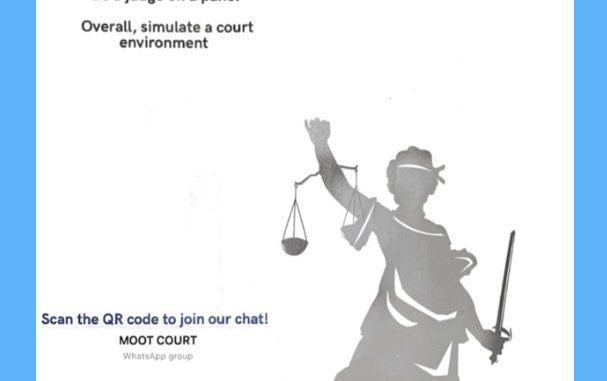
By Shlomie Katash
Moot court is a staple of any law school curriculum. And at Brooklyn College’s Moot Court Team, my peers and I hope to introduce it to prospective law students now.
The program, organized by the American Moot Court Association, is a competition between schools in which students argue over the legal details of a hypothetical case provided to them by the association. It’s an opportunity for students to explore complicated legal topics, expand their education, meet like-minded students, and build on their communication and presentation skills.
In my opinion, there isn’t any better chance for students even remotely interested in law school. It’s a place to practice what you love while refining your craft alongside people with similar goals. Not only is moot court itself an integral part of any law school experience, but familiarizing yourself with it can only be helpful for you on both a personal and professional level. The lessons you learn can also carry you a long way in any field of work. Any professional would say that researching, communicating, adapting, and corresponding with teammates are skills that are more than helpful in any office.
The competition we have at the Moot Court Team is unlike most other legal competitions that students may already be familiar with. It’s not a mock trial – there are no witnesses or juries – and it’s not a debate team – opposing teams aren’t directly communicating or arguing with each other in the proceedings.
Rather, in moot court, students argue over an appellate case, or a case that was already decided but is being reviewed to ensure that the verdict was correct.
Each side presents their overall argument in individual speeches given by each member of the team, but they must deal with questions from judges who are looking to properly decide on the case. Because of this, the most important skill for any student, beyond a vast knowledge of the case at hand, is the ability to think on their feet and adapt quickly to any difficulties.
Personally, as the group’s treasurer, I decided to help restart Moot Court not only because of a passion for the law, but for the chance to connect with students around Brooklyn College. It’s no secret that, especially after COVID, it’s been difficult for students to find opportunities to meet like-minded peers. I believe this is especially true when it comes to political science and pre-law students. Not only is finding such peers crucial for having a fulfilling Brooklyn College social experience, but it’s necessary for building a future career for yourself. Alumni networks, or any sort of community-building on campus, only work if students actually have a chance to meet each other.
With the Moot Court Team, we not only hope to give Brooklyn College students a chance to connect, but we hope to build an environment that lends itself to easy-going and spirited discussions, giving every student a chance to open up. For instance, the first case we’re covering is a famous hypothetical case about trapped cavers forced to cannibalize another to survive.
Should they be sentenced to death? It’s a difficult question to be tasked with answering, but it’s one that anyone, no matter their familiarity with the law, could pick up and talk about.
One day, we hope to expand Moot Court from just discussions and practices between students on campus to an actual team that competes regionally and nationally with other schools. Unfortunately, competitions begin in early fall, so it’ll have to wait. The work, however, starts now. By building a community on campus, we want to build the foundation of a successful, fun team that represents Brooklyn College on any stage.
If reading this opinion piqued your curiosity of moot court, consider joining us in 3129 Boylan on Nov. 22. In the next meetings, we hope to build upon the discussions of the theoretical miners case and introduce a legal case much more grounded in, well, the law.
